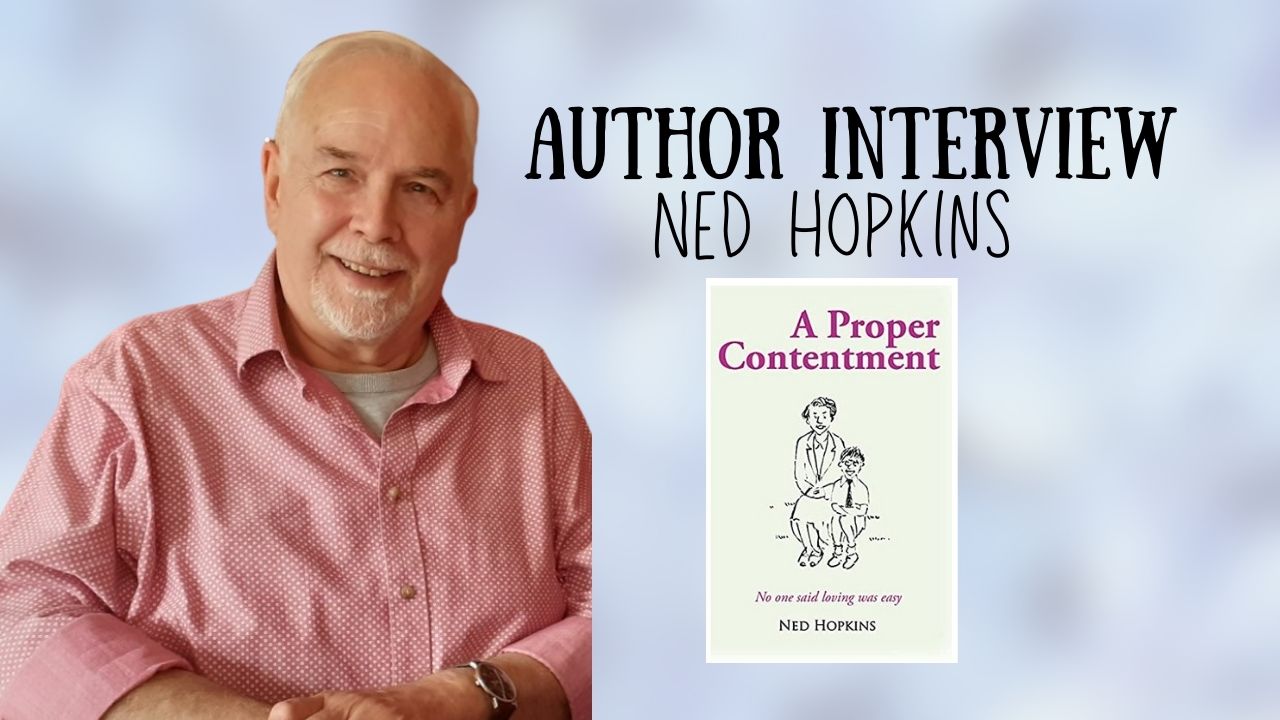As an Amazon Associate I earn from qualifying purchases.
Written by Ned Hopkins
Author Ned Hopkins explores the work that went into his new book, A Proper Contentment, and infusing his own life and coming out story into his characters.
Tell Me a bit about yourself
After a year working for the BBCI trained as a teacher specializing in Drama and have always been heavily in directing, acting and writing for the non-professional theatre. I am also a mature gay man who has often struggled with a society which, for a long time, was hostile to people like myself.

What prompted you to write A Proper Contentment?
Four years ago I published my debut novel Play On, about a group of people living – mainly– in Edinburgh, my birthplace and favourite city, in the year of the Scottish Referendum.
I was sufficiently encouraged by the feedback I got to begin on another story, this time based on my own family. Also, the isolation of lockdown made me realise how much I missed my parents – especially my mother.

You were very close?
Possibly too close. She was, in her way, a force of nature. I wanted to bring her back to life so that other people might meet her. She left behind a short-handwritten memoir of her struggle to gain independence from her tenacious family in the early part of the last century.
It stops when, aged thirty, she married my dad a few months before the outbreak of WW2 and moved with him to live in Scotland where, despite fresh challenges, she found her own ‘contentment’.
You were born during the war?
Yes, I was to be an only child so, inevitably, our stories intertwined. I began to see the book as the parallel biographies of Bessie and Sam told against the backdrop of life and changing social attitudes in the UK over the twentieth century.
When did you first guess you were gay?
In 1951 we moved from Scotland to live in London. I was six but increasingly became aware of how, with my Miss Brodie voice and buttoned-up behaviour, I was different to other boys and began to be bullied. In the Fifties, homosexuality was rarely if ever discussed.
Being attracted to one’s own sex was considered an aberration. You were a ‘poof’ or a ‘pansy’. Mercifully, I found an outlet in performing and creative writing. And my ability to make friends easily has been another mainstay though life. You never made the mistake of coming out to people at work and would have been considered a deviant – and possibly assumed to be a paedophile too.

When, in 1967, being gay finally became legal – though only between men in England over the age of twenty-one, in private – old attitudes still died hard. One chapter in my book describes how insidious homophobia could be in the workplace, and probably still is.

Why fictionalise Bessie and Sam’s lives?
Bringing people back to life meant getting inside their heads. I had to use my imagination to fill in the gaps – although I sometimes heard the warning voice of my mother saying ‘I’d never have said that’ when it was tempting to satirise her! I decided it would read more smoothly if I tidied up our cluttered lives and focused only on incidents that moved events significantly forward.
In fact, in the second part of the book, everyone winds up in Manchester whereas, in fact, our lives continued at a distance from each other in London and Surrey. Manchester has always been another special place for me. I nearly worked there, and it was where my play A Lot of it About was professionally staged at The Lowry in 2013.
How accurate is your ‘supporting cast’ to people in you and your mother’s lives?
To protect the guilty, I gave everyone different names and telescoped characteristics of various friends and lovers etc. My fiancé Jennie is a composite of two women I hurt badly and deserved better of me. I hope if either reads the book that they will forgive me.
The last section with the introduction of Robbie deals with very similar issues to those my real-life partner and I were faced with when we met, but Robbie is completely imaginary as is his own family. Bessie’s reaction to the situation is, however, completely truthful.

Which parts of the book did you enjoy writing the most?
I think there must be something of the social historian in me as I particularly like reliving key events such as the Festival of Britain in 1951, the great Smog the following year and later, researching the role of Manchester played in the development of the gay movement in England and in the AIDS crisis. Trying to analyse key moments in my own emotional development was therapeutic too.
And did you really find a proper contentment?
You better ask my partner. We’ve been together for nearly thirty years. Hopefully that says everything!
Where can people find you?
Website: nedhopkins.com
Linkedin: Ned Hopkins (Raymond Langford Jones) – GARDENCOURT PLAYS – Gardencourt Plays | LinkedIn
Facebook: https://www.facebook.com/home.php
We strive to keep The Table Read free for both our readers and our contributors. If you have enjoyed our work, please consider donating to help keep The Table Read going!
Amazon and the Amazon logo are trademarks of Amazon.com, Inc, or its affiliates.


